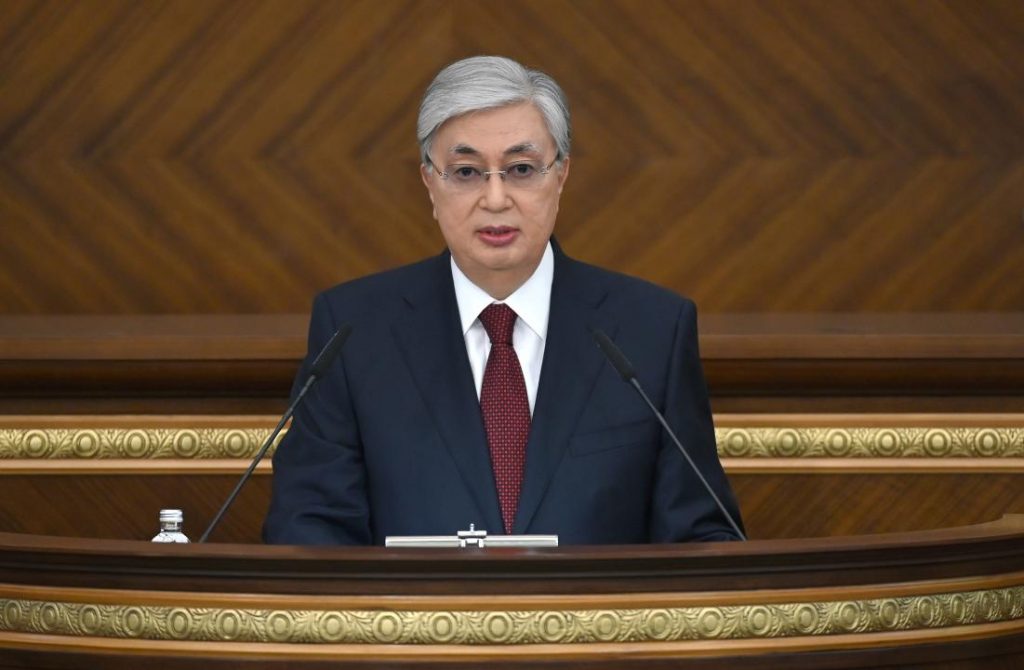
Kazakhstan President Kassym-Jomart Tokayev’s address to the nation, which was delivered on March 16, outlines a programme for the large-scale transformation of the country and shows the way forward towards building a New Kazakhstan.
“The significance of today’s address is special. Its scope of work is not limited to one year. It is broad in scope and content. Our goals are high. Together with you we began creating a New Kazakhstan,” the President said.
Mr Tokayev started by talking about the tragic events that took place in early January 2022 when Almaty and a few other cities and towns were engulfed by violence.
“Under the leadership of the First President, Nursultan Nazarbayev, we have come a long way, we have made significant achievements, but we can lose everything if we do not maintain unity,” he said. “The upheavals at the beginning of the year have clearly confirmed this.
“The events of January shook the society. Our people faced an unprecedented challenge, with the country’s integrity under threat. During these days, we have deeply realized the lasting value of independence and how important peace, stability, and harmony are.
“Thanks to our unity, we have defended our state. We have taken timely measures and have decisively repelled the terrorists.”
Nearly 2,000 suspects have been detained and the investigation is still underway.
He noted that the people understood the importance of peace and stability and that it is necessary to keep this unwavering unity. He called on people “to work together to build a new Kazakhstan”.
Political reforms a priority
Mr Tokayev reiterated that political reforms are a priority. The course towards political liberalization was set forth in his election programme in 2019. The President has promoted political transformation through specific initiatives during his state-of-the-nation addresses in 2019, 2020 and 2021.
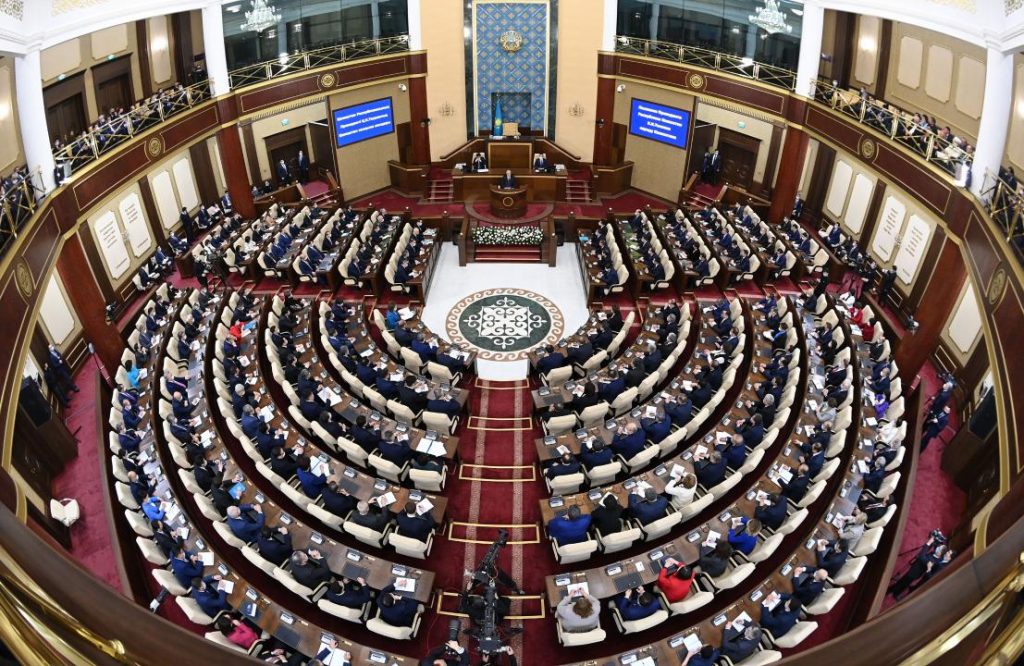
“Four political reform packages have been implemented for further democratization. This led to positive changes in the society as more than ten laws have been adopted in the political sector only. For example, the new democratic law on peaceful assemblies. It allows activists, including opposition-minded public figures, to hold rallies and express their opinions there,” he said.
Before announcing the political reform programme, Mr Tokayev noted that these reforms are set to meet the demands for radical changes.
The programme is also based on the recommendations provided by the deputies of the Parliament, the Constitutional Council, the Central Election Commission, the Supreme Court, the expert community and the members of the National Council of Public Trust. The proposals made by representatives of political parties, civil activists and non-governmental organizations have also been considered.
“The programme will contribute to a consistent democratization and ensure the stability of the state,” said Mr Tokayev.
The programme for political reform sets limits to Presidential power, introduces a mixed proportional-majoritarian electoral system and changes in the formation and functions of the Parliament, strengthens the role of maslikhats (local representative bodies), increases the role of civil society institutions and the media and protects human rights.
The key powers of the main government institutions will be reviewed: the president, parliament, local self-government, party, electoral, judicial and law enforcement systems. A fundamentally new sustainable system of checks and balances will be formed.
Judicial reforms
Reforms in the judicial and law enforcement systems are also a priority.
The President announced plans to alter the distribution of power and make a shift from the office of the Presidency to a strong Parliament through enhancing the power and responsibilities of the legislative body of the government.
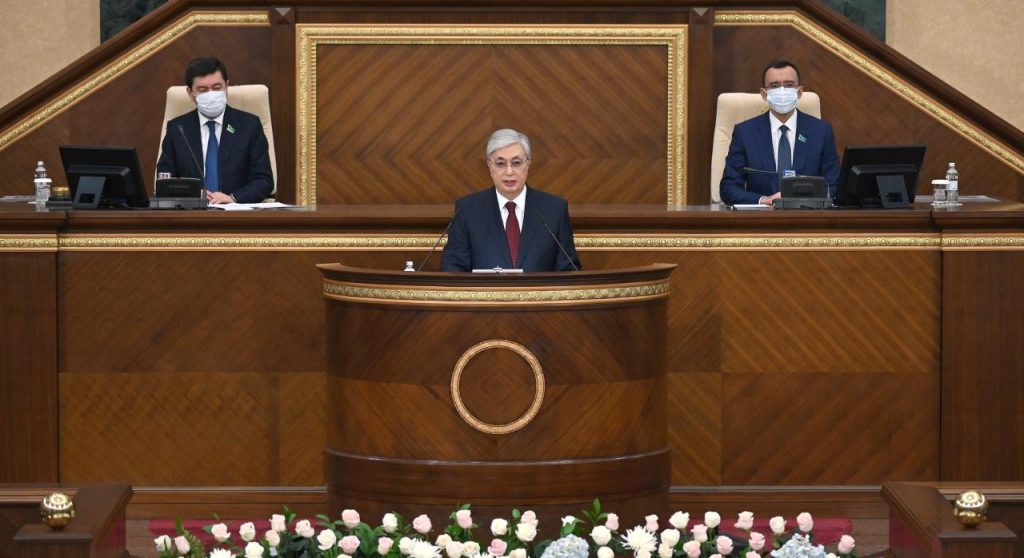
The President’s current right to cancel or suspend the legal acts issued by regional akims (governors or mayors) can also be abolished, he argued. The reforms to increase the role of the Parliament should start with the review of the formation and functions of the Senate (upper house of Parliament) and the Mazhilis (lower house of Parliament).
“The key goal of the country’s political modernization is to increase the role of people in the state governance through electoral processes,” he said.
The Mazhilis electoral system will be transformed into a mixed proportional-majoritarian model, where 70 percent of deputies will be elected by a proportional model through lists of candidates from political parties and 30 percent by a majoritarian rule, where independents may run. This will open the doors for the participation of candidates that are not nominated by political parties.
Favorable conditions will be created for the institutional and organizational development of parties to ensure free political competition. The changes include the simplification of party registration procedures and electoral campaigns to overcome obstacles in conducting fair and transparent elections.
Checks and balances
There will be a significant weakening of the presidential powers. The President is also legally obliged to terminate his/her membership in a political party for the duration of his/her term of office. A legislative ban on holding positions of political civil servants and managers in the quasi-public sector will be introduced. This will minimize the risks of the concentration of power by future presidents.
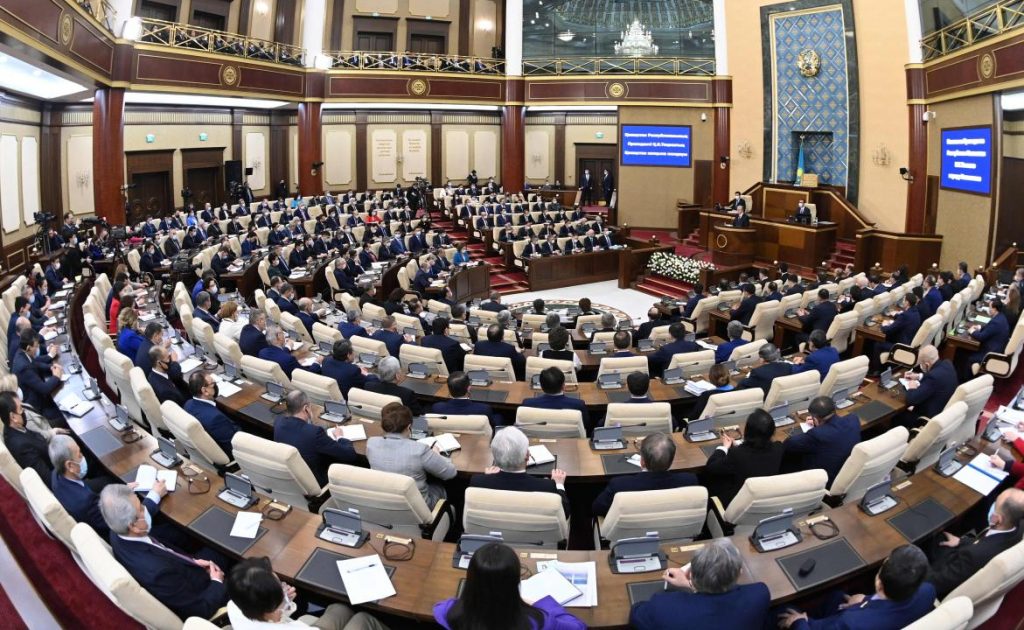
The system of checks and balances of the President and Parliament are being improved. The presidential quota in the Senate has been reduced from 15 to 10 seats. At the same time, half of the new quota, i.e. five candidates, will be recommended by the Assembly of the People of Kazakhstan. In order to be appointed by the President, the Chairperson of the Constitutional Court and the Chairperson of the Supreme Judicial Council need the consent of the Senate of the Parliament.
The President proposed the establishment of the Constitutional Court, whose council is responsible for the interpretation of legal norms. The Prosecutor General and the Commissioner for Human Rights might be given the right to appeal to the Constitutional Court, in addition to the President and the Parliament.
“These initiatives are an important step in building a just and legal state, strengthening the system of checks and balances and protecting the constitutional rights of the people,” he said.
Protecting the rights of the people
The President emphasized protecting the rights of people was a matter of particular importance.
Kazakhstan ratified the Second Optional Protocol on Civil and Political Rights aimed at the abolition of the death penalty in 2020. A number of initiatives were also implemented for long-term and comprehensive development in this area.
“I believe that in order to consolidate the decision to abolish the death penalty, it is necessary to make appropriate changes to the Constitution. It is important to introduce a systematic approach to the investigation of crimes related to torture. I propose to assign responsibilities for investigating cases of torture to the Prosecutor General’s Office,” said Mr Tokayev.
The President also proposed to review the laws on the media with a mission to build an environment for more open, competitive and responsible media.
Public organizations and activists should take part in the preparation and implementation of reforms to ensure open discussions of all national projects and strategic documents.
Reorganization of the regional structure
The President remains committed to the “strong regions – a strong country” principle. He proposed a reorganization of the regional structure of the country.
The Abai region will be established with a center in Semei city. The Ulytau region will be established with the center in Zhezkazgan town. The Almaty region will be divided into two regions – the Almaty region with the center in Taldykorgan, and the Zhetisu region with the center in Kapshagai.
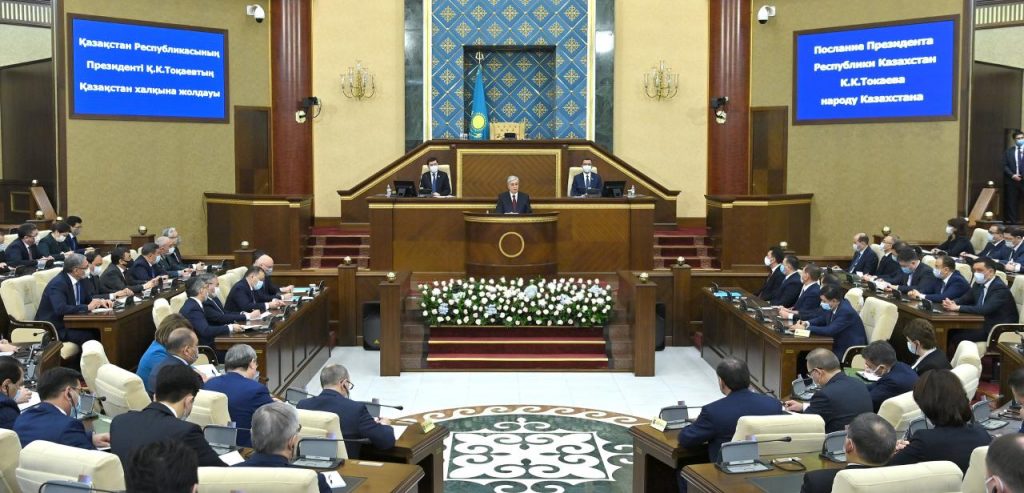
Overall, more than 30 articles of the Constitution need to be amended to implement the President’s initiatives. In addition, more than 20 laws will be adopted by the end of the year.
“We should preserve our independence, strengthen the national identity and focus on the transformation of the country. This is our duty to future generations… We should follow the main principle – different views, but a single nation in a new Kazakhstan,” he said.
Building of a new Kazakhstan
State Secretary Erlan Karin believes that the address to the nation is the starting point for the building of a new Kazakhstan.
“The initiatives represent a well-balanced programme of reforms aimed at a transformation of the system of government institutions, an increase in civic participation and the formation of a new political culture in Kazakhstan,” Mr Karin posted on Telegram.
This will lead to positive changes in the social sphere, increase political stability, contribute to the multipolar party system, promote civic activity in the decision-making process, strengthen human rights protection and improve the administrative-territorial structure.
“The reform in the parliamentary system intends to strengthen the role of the Mazhilis and the influence of the legislative branch of power. The procedure for the formation of the Mazhilis and the Senate is important. A mixed electoral system of the Mazhilis will strengthen its institutional legitimacy. The Senate strengthens its role in promoting the interests of the regions, underrepresented social and ethnic groups,” he said.
All the initiatives will have an impact on the formation of a new political culture in the country and strengthen trust between the authorities and people, said Mr Karin.
Mazhilis deputy and candidate of Sociological Sciences Yuliya Kuchinskaya noted that every citizen should take part in building a new Kazakhstan.
“The implementation of these initiatives will contribute to further changes in our lives, changes in the current model of behavior, ways of interaction between government agencies. We should ensure that new conditions and formats of interaction develop, so that new principles work,” Ms Kuchinskaya told the Kazinform news agency.
The financial independence of maslikhats from local executive bodies is also an important initiative that strengthens the role of representative bodies.
Some 47 deputies of the Senate and 103 deputies of the Mazhilis, the Prime Minister, the Secretary of State, heads of state bodies, local executive bodies, regional governors, representatives of non-governmental organizations and the members of the National Council of Public Trust took part in the joint session of the chambers of the Parliament.
Sweeping reforms went beyond expectations
Mr Tokayev’s sweeping reforms went beyond expectations and will strengthen the political system’s agility and responsiveness to the people’s demands, Kazakh experts noted during a roundtable on March 17.
Mr Yerkin Tukumov, Director of the Kazakhstan Institute for Strategic Studies, said the address paves the way for the country’s New Kazakhstan agenda.
“The new reforms have taken into account the voice of the whole society, including the recommendations of members of the national council of lawyers, political scientists, independent and government experts,” said Mr Tukumov.
He said one of the President’s messages was that no other reforms are possible without political reforms.
Director of the Kazakhstan Institute of Social Development Kazbek Maigeldinov said: “The biggest criticism of the local public was the quality of work of local executive authorities: akims (governors of regions and city mayors), deputies, members of the maslikhat (local representative bodies).”
“Unfortunately, previously, when candidates were elected based on party lists, there were different opinions among people, who did not recognize (party of those) candidates. Candidates were mostly unknown to the local population. Now, with the transition to a fully majoritarian system (at local levels), if you have the will to develop your city or region, you will have the opportunity to be elected to the maslikhat, or as a district’s akim,” said Mr Maigeldinov, stressing the importance of such transition.
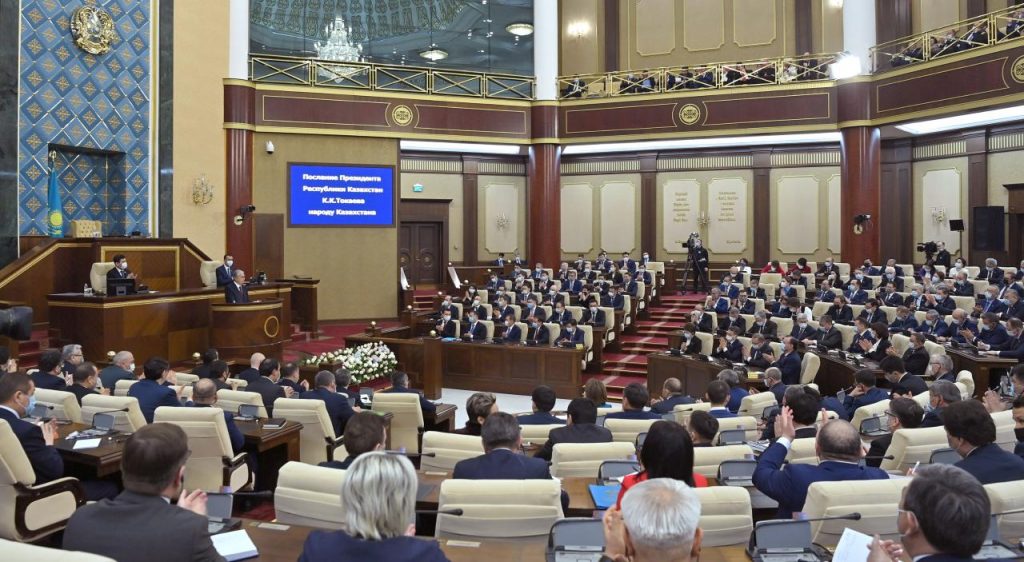
Experts also agreed the introduction of three new regions – Abai Oblast, Ulytau Oblast, and Zhetisu Oblast – will expand the opportunities for local self-goverment and allow for efficient decisions to ensure broader regional development.
Director of the Institute of State History Erkin Abil said: “Without public trust in regional authorities, the system of self-organization will be very difficult to maintain. We have a unique chance to create a new model of regional government.”
Mr Maigeldinov said the establishment of new regions has received enthusiastic support from citizens.
“There is a historical and cultural symbolism of those regions. Semei Region is the birthplace of the great Kazakh poet Abai, Zhetisu is also a land of great historical importance. There are many historical and cultural complexes in Ulytau: the mausoleums of Zhoshi khan and Alasha khan. Unfortunately, there are no proper roads to go to those places. Infrastructure development requires a clear budget consolidation in that region. With the new regional structure, those regions will have a good chance to become an attractive tourist destination not only for people in Kazakhstan but also from outside,” said Mr Maigeldinov.







